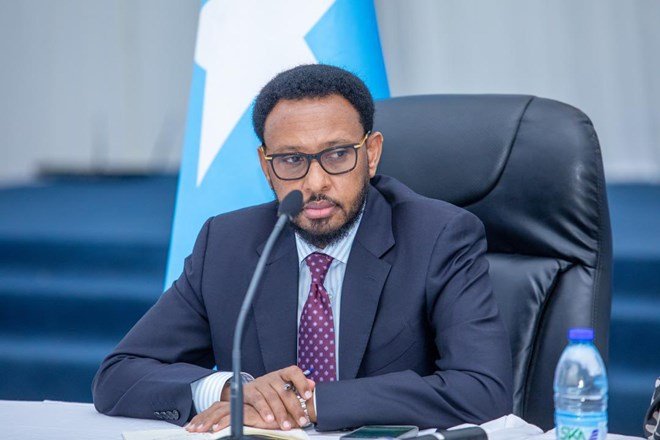Wednesday 12,Feb,2025 {HMC} E Somalia’s Minister of Finance Bihi Iman Egeh announced that the country has successfully settled around $4.5 billion in debt under the Heavily Indebted Poor Countries (HIPC) Initiative led by the International Monetary Fund (IMF). He attributed this milestone to major institutional and financial reforms, as well as increased domestic revenue mobilization.
In an interview with Asharq Al-Awsat, Egeh emphasized that Mogadishu views Riyadh as a key strategic partner in fostering economic growth and enhancing security and stability. He also praised Saudi Arabia’s pivotal role in facilitating Somalia’s debt relief efforts.
Egeh outlined Somalia’s priorities for the next phase, with a strong focus on attracting investments, particularly from Saudi Arabia, in key sectors such as livestock, renewable energy, the blue economy, and natural resources, including gold and minerals.
He said that in December 2023, Somalia reached the completion point of the HIPC Initiative—a process nearly a decade in the making. This achievement followed a series of reforms aimed at rebuilding state institutions, improving public financial management, and implementing broad economic policies. As a result, Somalia successfully restructured its debts, particularly those owed to members of the Paris Club and other international creditors.
Saudi Arabia’s role
Egeh confirmed that Arab financial institutions were part of the Paris Club negotiations and that Somalia had settled its obligations, including debts owed to the Saudi Fund for Development. He acknowledged Saudi Arabia’s critical role in facilitating and supporting the restructuring of Somalia’s debt.
The minister underscored the strong and ongoing coordination between Mogadishu and Riyadh, particularly in security matters. He revealed that a Somali delegation, including security officials, was currently in Saudi Arabia discussing strategies for combating terrorist groups.
Additionally, Somalia’s National Intelligence and Security Agency (NISA) has a mission in Jeddah to strengthen bilateral cooperation beyond financial matters, extending into military and intelligence coordination. Egeh stressed his country’s commitment to expanding this partnership to effectively respond to security threats, noting that terrorist groups operate across borders, posing a shared threat to regional and global stability.
Boosting investment and economic growth
Following its debt relief success, Somalia is now focused on economic development and attracting foreign investments. The government is preparing to sign a new program with the IMF to build on the progress made through debt relief and solidify economic reforms.
Egeh stated that Mogadishu has taken significant steps to improve the investment climate and regulatory framework, offering incentives to investors. He emphasized Saudi Arabia’s importance as a historical and geographical partner in the Red Sea region, positioning it as a priority market for Somali investments.
Key investment sectors
Somalia, home to Africa’s longest mainland coastline, offers vast opportunities in the blue economy, fisheries, and untapped natural resources. Egeh pointed to agriculture and livestock as particularly promising sectors for investment.
Saudi Arabia is Somalia’s largest trade partner, importing between three and five million livestock annually. The minister highlighted opportunities to modernize and expand this trade by upgrading the agricultural and livestock sectors.
He also pointed to significant potential in renewable energy, which could have a transformative impact on industries such as livestock farming and cold-chain logistics within the blue economy. Additionally, Somalia’s vast mineral wealth—including gold and other valuable minerals—positions the country as an attractive destination for investors.
Security concerns
Egeh noted Somalia’s history of security challenges, but stressed that over the past 15 to 20 years, the country has been on a steady path toward rebuilding its economy and strengthening security.
The Somali government has launched an aggressive military campaign against the extremist Al-Shabaab group, liberating more than 80 villages. Egeh stated that these security gains create a significant opportunity to attract investments and revitalize the economy.
According to the minister, Somalia has adopted a three-pronged strategy to combat Al-Shabaab and other extremist groups. The first involves countering their ideological influence by educating communities about the false narratives promoted by these organizations. The second targets their financial networks by cutting off funding sources. The third focuses on direct military engagement to dismantle their operational capabilities.
Egeh noted that his country has made significant progress in disrupting terrorist financing, shutting down thousands of suspicious accounts on electronic money platforms and in traditional banks. These measures have severely weakened Al-Shabaab’s ability to generate revenue through extortion and illegal taxation.
He pointed out that before the current Somali government took office, Al-Shabaab had access to substantial financial resources, posing a regional threat across Africa and the Middle East. However, recent countermeasures have significantly diminished the group’s ability to fund operations, both within Somalia and beyond.
Somalia is also engaged in a campaign against ISIS militants operating in the country, particularly in the northeastern regions. Egeh revealed that government forces have reclaimed significant territory and destroyed ISIS strongholds.
Potential Al-Shabaab links with Houthis
When asked about possible ties between Al-Shabaab and Yemen’s Iran-backed Houthi militias, Egeh said that while no direct connections have been confirmed, Somalia remains vigilant against any emerging alliances between terrorist groups.
He reiterated that his country’s primary goal is the complete eradication of both Al-Shabaab and ISIS to prevent them from destabilizing the broader region.



